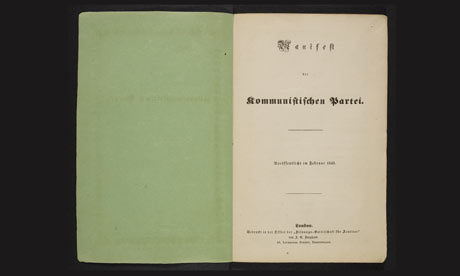Ten of the best political documents
The reports, acts and manifestos that defined the world we live in today

Magna Carta
The Great Charter of Freedoms, signed reluctantly by King John in 1215, is the foundation of constitutional law across the globe, enshrining what became the writ of habeas corpus and protecting individuals from unlawful imprisonment. English barons, enraged by John's arrogance, forced the document upon him to rein in his powers and shelter their own privileges. Among a wide variety of provisions, such as the removal of all weirs and a ban on men being imprisoned on the testimony of a woman, it established the supremacy of the law over the king's will, allowed for a fixed law court, later the chancellery, and created an independent council that became a prototype parliament.
Universal Declaration of Human Rights
The second world war had ended three years previously, leaving nations scarred, traumatised and determined to make a better fist of things. The document recognises that respect for human dignity is the surest platform for peace and justice and it proclaims four fundamental rights: freedom of speech and belief, freedom from want, and freedom from fear. It isn't legally enforceable, but it defines the freedoms and rights set out in the United Nations Charter, which is binding, and its provisions – including a ban on torture, slavery and discrimination – have found their way into most constitutions since 1948.
Slavery Abolition Act 1833
The slave trade had been illegal since 1807 when the Slave Trade Act levied penalties of £100 a captive on defiant British captains, but slavery itself continued unmolested, while importers found ways to get round the ban. This second act abolished the practice throughout most of the British Empire and freed nearly 800,000 African slaves. For its time, the act was costly – the Exchequer had to find £20m (40% of the government's annual expenditure) to compensate disgruntled plantation owners. However, only slaves aged under six were liberated; the rest had to serve "apprenticeships" with their owners for four to six years, and unfortunates enslaved in lands owned by the powerful East India Company were ignored by the legislation.
United States Declaration of Independence
The second sentence – "We hold these truths to be self-evident, that all men are created equal, that they are endowed by their Creator with certain unalienable Rights, that among these are Life, Liberty and the pursuit of Happiness" – is one of the most famous in the English language. The point of the statement, drawn up by Thomas Jefferson, was to declare American independence from the British Empire. It also outlined an uplifting definition of human rights, including the right to revolution, which Abraham Lincoln reckoned should be guiding principles in interpreting the US Consititution.
Rights of Man
Thomas Paine's tract, published in 1791, so inflamed the conservative powers in England that he was sentenced to hang, but he nipped over to revolutionary France where his inflammatory style was more admired. Paine declared that revolution is permissible when the rights, interests and safety of the people are at risk. Since the sole purpose of government is to preserve the above, he believed that all men should have the vote, and that the monarchy, the nobility and the military are illegitimate. He proposed a written constitution, the elimination of primogeniture, a progressive income tax to squeeze wealthy estates, and subsidised education for the poor.
Beveridge report
The cornerstone of the welfare state and a reinterpretation of the role of government. In 1942, in the midst of the second world war, this white paper sketched the practicalities of a brave new world and was hailed by the Archbishop of Canterbury as "the first time anyone had set out to embody the whole spirit of the Christian ethic in an act of parliament". Its author, economist William Beveridge, pinpointed five "giant evils" in modern society: squalor, ignorance, want, idleness and disease. The reforms he proposed grew, after the war, into the NHS, social security, redistributive taxation and state pensions.
Representation of the People Act 1867
Its catchier name is the Second Reform Act. The groundwork was achieved 35 years earlier when the Reform Act 1832 cleaned up various unwholesome aspects of the electoral system by eliminating some of the whiffiest of the rotten boroughs and enlarging the electorate by 60%. However, that still left most of the population unable to vote, so the successor act enfranchised a swath of the working classes. At first only "respectable" workers were to be privileged, but political oneupmanship led to the Conservatives venturing more drastic reforms that made most urban householders eligible (provided they were male, naturally).
The Communist Manifesto
"A spectre is haunting Europe – the spectre of communism," begins Karl Marx's 1848 exposition on communist belief. History, asserts the manuscript, is all about class struggle between those who own the means of production and those who toil to produce for wages, and one day the latter would overthrow the former. Self-interest and exploitation are the chief currency of capitalism and among proposed measures to vanquish these were a confiscation of private property, progressive income tax, free education and nationalisation of transport, credit and communication. However destructive the political results, Marx's analysis contains social truths still relevant today.
Summa Theologica
Thomas Aquinas, one of the fathers of western theology (1225-74) describes the circumstances under which a just war may be declared. This, he says, requires: a legitimate authority, ie a legal ruler; a just cause and a right intention. A second set of criteria were traditionally added, relating to the conduct of war. These emphasise proportionate use of force and immunity for non-combatants. Modern events, in particular the war in Iraq, have raised the question of what constitutes a legitimate authority, while many have questioned whether, by these criteria, any war can be justified.
Cyrus Cylinder
One of the world's first charters of human rights, or cynical propaganda, depending on how you look at it: it's a fat clay cylinder detailing the virtues and achievements of the Persian ruler Cyrus the Great following his conquest of Babylon in 539BC. Whereas most invaders took pride in detailing their destruction of conquered lands, Cyrus curries favour by pointing out how he has restored peace to Babylon, repaired his subjects' houses and temples, restored their cults and allowed displaced peoples to return to their homelands. Iranian human rights lawyer Shirin Ebadi hailed the charter as "one of the most important documents that should be studied in the history of human rights".

沒有留言:
張貼留言